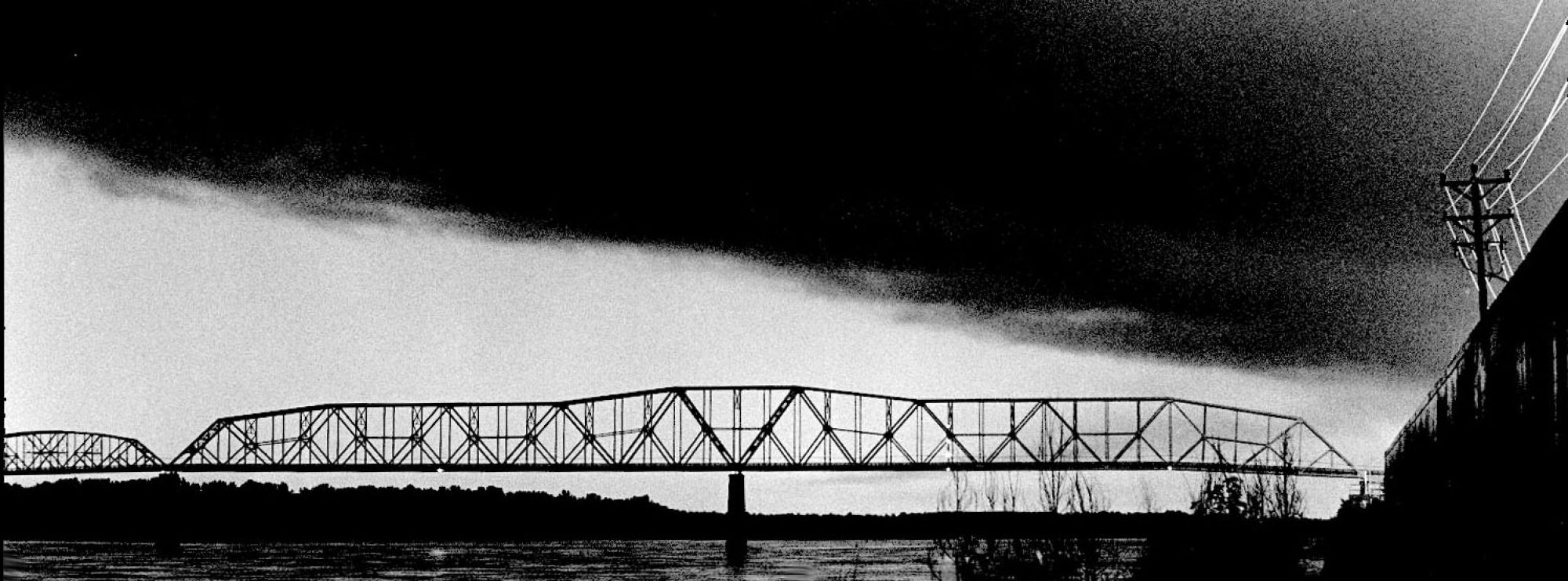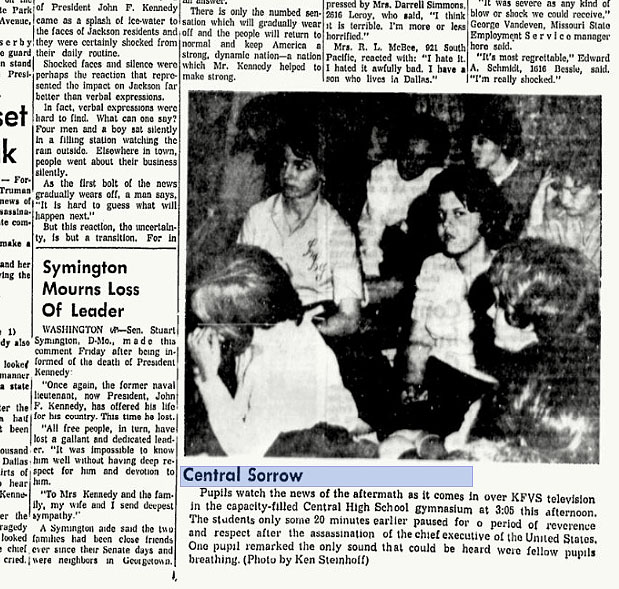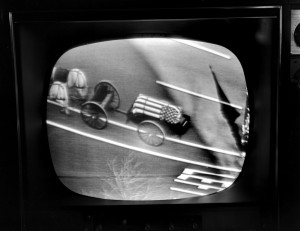 This is the week when you’ll be seeing lots of stories about the Kennedy Assassination. In fact, National Geographic wanted to use one of these photos on a website dealing with the shooting.
This is the week when you’ll be seeing lots of stories about the Kennedy Assassination. In fact, National Geographic wanted to use one of these photos on a website dealing with the shooting.
Most of this information came from a story I wrote in 2010 about a flashback I had while visiting Alma Schrader School during a tornado drill.
Since the Kennedy assassination was one of those defining moments for our generation, it’s appropriate that I repost this. Unfortunately, assassinations and attempted assassinations were going be become almost commonplace over the next five decades.
From the 2010 story
My memory is a funny thing. It’s full of old stuff waiting for some kind of electrical spark to flicker between it and something I encounter in Today’s World. When I looked out the door at the gray skies, I flashed back to a stormy Friday afternoon on November 22, 1963.
The American History teacher was droning on. We were waiting for the end of the day and the start of the weekend. The PA crackled to life and we looked out at the threatening clouds wondering if we were going to hear a tornado alert.
Principal Fred Wilferth announced that President John F. Kennedy had just been shot in Dallas, Texas. Not long after that came the bulletin that the President was dead.
The Missourian reported that Central High School “held a period of respect and remembrance [that began] at 2:45, lasting several minutes.”
“All you could hear was breathing”
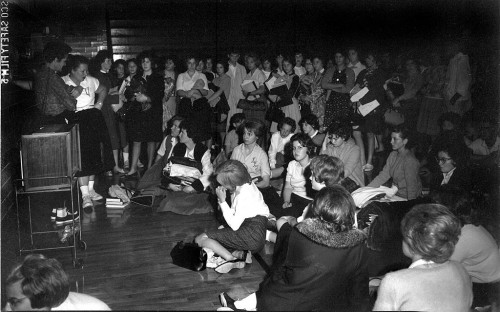 Shortly after that, a television set with rabbit ears was wheeled into the gym, where shocked students watched the story unfold. As soon as I saw the scene, I called The Missourian and told Editor John Blue that I’d have something for him. That promise would soon come back to haunt me.
Shortly after that, a television set with rabbit ears was wheeled into the gym, where shocked students watched the story unfold. As soon as I saw the scene, I called The Missourian and told Editor John Blue that I’d have something for him. That promise would soon come back to haunt me.
EXTRA! EXTRA!
He said the paper was going to publish an EXTRA edition, but I’d have to hurry. They wanted the paper on the street by 6 p.m.
I ran up to the school darkroom, grabbed the Crown Graphic 4×5 camera and two holders of film. One side was empty, so that left me three shots. I didn’t see the school’s electronic flash, so I grabbed three old-fashioned flash bulbs on the way out the door.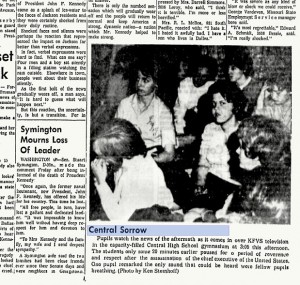
Without getting too technical, the camera had to be set differently for each type of light. An electronic flash fires a very short burst of light, so the shutter has to be fully open when it goes off (that’s the X setting). A flashbulb ignites, then it gets progressively brighter until it dims out. That means it has to fire slightly before the shutter does so it is at maximum brightness when the shutter is open all of the way (that’s the M setting).
In my excitement, I didn’t notice that the camera was set for electronic flash. When I pulled the dripping film out of the fixer, my heart sank. It was almost blank. There was hardly any image on it at all. The flashbulb hadn’t had time to get to full brightness before the shutter closed.
Darkroom Magic
I knew I didn’t have time to reshoot the picture, even if the students were still around. I pulled out what meager little bag of magic darkroom tricks I had learned and managed to come up with a shot that made the paper.
It was the last time in my entire career that I ever told an editor that I had a picture before I saw it. You have to remember that my first Missourian news photo was published April 18 of that year. My credibility was on the line. You don’t tell someone to hold space in an EXTRA! unless you can deliver.
By the way, the “pupil” quoted as saying all he could hear was the sound of his fellow classmates breathing was me. The Missourian had this quaint style rule that you were a “pupil” until you were in college. Then you were promoted to “student.” I tried every way I could to get the style changed, but never succeeded.
Here’s a link to the EXTRA! edition. You’ll have to play around with the zoom settings on the page to be able to read it.
Polio Vaccine and Lee Harvey Oswald
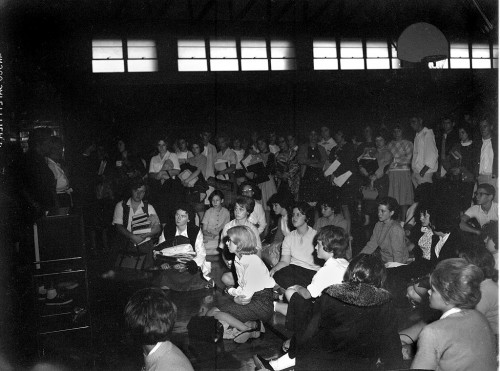 I’ll publish all three photos, warts and all. In some ways, the dust spots, fingerprints and bad exposure makes the images feel more “real.” Or, that’s the excuse I’ll use.
I’ll publish all three photos, warts and all. In some ways, the dust spots, fingerprints and bad exposure makes the images feel more “real.” Or, that’s the excuse I’ll use.
My family and I went to Central High School on the Sunday after the assassination to get sugar cubes with drops of polio vaccine on them. When we got into the car to go home, we heard the news that Jack Ruby had shot Lee Harvey Oswald while he was being transferred from the jail to an interrogation room.
A change in the news business
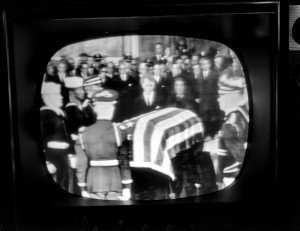 The assassination, Oswald shooting and Kennedy funeral changed the way Americans would get the news. I know the The Palm Beach Evening Times put out an EXTRA! edition when the Challenger exploded. I’m pretty sure that was the last extra edition I ever worked on.
The assassination, Oswald shooting and Kennedy funeral changed the way Americans would get the news. I know the The Palm Beach Evening Times put out an EXTRA! edition when the Challenger exploded. I’m pretty sure that was the last extra edition I ever worked on.
Radio and TV were much better equipped to handle breaking news. (I would argue that the 24-hour cable channels have mishandled breaking news in recent years with their obsession of staying live when there’s nothing going on.) The printed newspaper provided a keepsake and tangible proof that an event happened in a way that broadcasting couldn’t, but the Internet has essentially driven a stake through the heart of traditional media.
The screen shots, by the way, were taken off the Steinhoff family Zenith TV in our basement.
Innocence ended
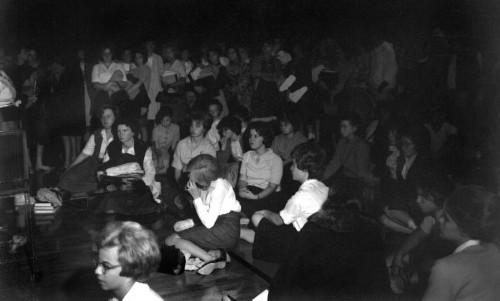 JFK’s assassination was the first in a wave of killings and attempted killings: Martin Luther King, Malcolm X, Robert Kennedy, Gerald Ford, Ronald Reagan… Unfortunately, we have continued to add to that list since this piece was originally written.
JFK’s assassination was the first in a wave of killings and attempted killings: Martin Luther King, Malcolm X, Robert Kennedy, Gerald Ford, Ronald Reagan… Unfortunately, we have continued to add to that list since this piece was originally written.
None of us who lived through that era emerged untouched. If you don’t believe it, look how a tornado drill at an elementary school in my home town can give me a flashback to a Friday afternoon nearly half a century earlier.
